Many Outlander fans can lose focus and get their knickers in a twist arguing historical context in their favorite series. Here we take a look at presentism pitfalls in Outlander.
What draws people to historical fiction? I can tell you what draws me. I love feeling transported to a different time and immersed in that world. I want to experience history through characters I love. I want to understand their daily life with all its struggles, challenges and simple joys. What dangers did they face, and how did they survive? What did they value and why? What were their notions of morality and honor? A journey to the past can enlighten the present and guide the future.
Is this true for you as well? If so, you may be setting up a roadblock that keeps you from that journey. It’s called presentism, and it prevents you from truly “feeling transported to a different time and immersed in that world.” You can’t because you don’t allow your mind to let go of the present.
Here’s what Diana Gabaldon says about presentism:
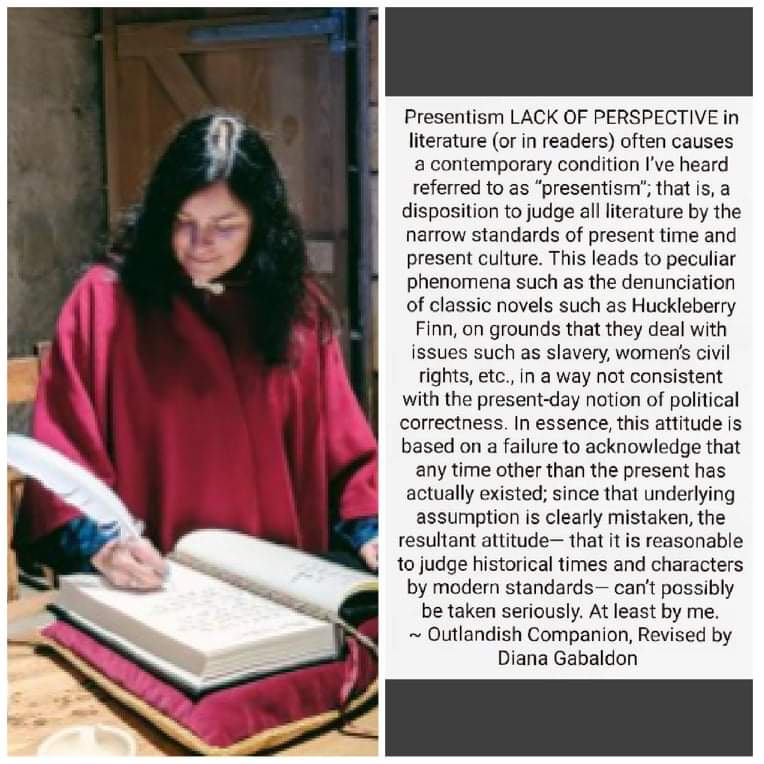
Presentism means judging past actions by today’s standards, maintaining an unrealistic adherence to present-day attitudes, or the tendency to interpret past events in terms of modern values and concepts.
Readers and viewers are not the only ones who can fall into this trap; authors and scriptwriters can as well. A fearful writer might sugar coat actions they don’t like (or think their audience won’t embrace). A biased writer may purposefully skew reader/viewer perception toward a current cultural norm or political statement. Even Outlander writers often give a current “cleanse” to the book material. (More on this later). Presentism manifests itself in several ways and often obstructs your ability to truly appreciate this genre..
Even Jamie tried to make us understand this concept:
At this point, Jamie didn’t know Claire was from the future, but he knew she was different. In his culture, women didn’t defy men. They didn’t mouth off and challenge them. Women depended on men for their survival and protection, and they deferred to a man’s word. In that time and culture, most women did not feel themselves entitled to have their own opinion (at least not spoken aloud in that manner). She obviously came from some place that differed vastly from his own.
Jamie addresses this again in “The Reckoning” when he says to Claire, “You come from a place where things are easier, I think… where it’s no a matter of life and death if you disobey orders or take matters into your own hands. But it’s the hard truth in places and times like these that a light action can have very serious consequences.”

Jamie continually warns Claire (and eventually Bree) that the norms and rules of their own time do not apply in his world. They MUST understand and adapt, or face severe danger and disappointment.
Diana often shows the reverse as well. Claire, Bree and Roger often leave Jamie and Ian awestruck, amazed, horrified, amused, shocked, appalled and intrigued with words and actions that seem commonplace to us. (For example, poor Claire constantly tries to convince those she loves that germs exist and cause sickness, and vegetables contain vitamins that can prevent it. Her 18th century kin scoff at the idea that an invisible “wee beastie” could possibly kill them … how preposterous! However, they know better than to argue too much.)
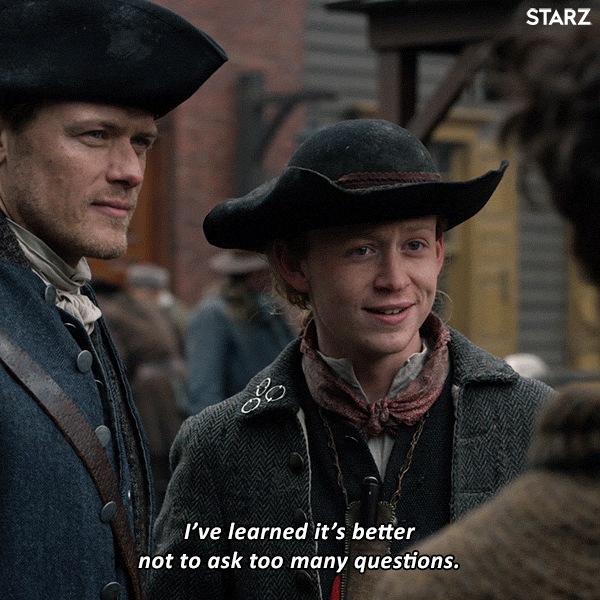
And who could forget Jamie’s reaction to his bikini-clad daughter?
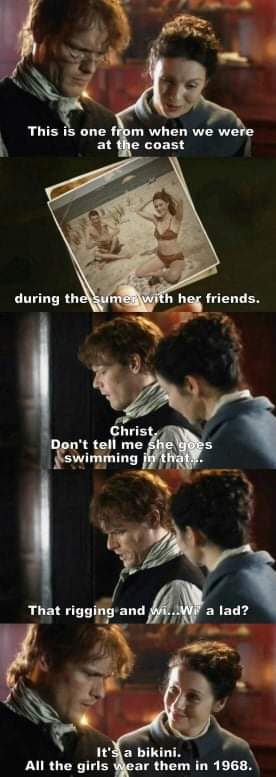
Both Diana and the showrunners use these moments to constantly remind us as well. Two hundred years of progress separate these characters from each other, and 250-275 years separate them from all of us today. (After all, Jamie turned 298 years old in May!) None of these characters — even Frank, Claire, Brianna and Roger — are “modern.” We often forget that their “time” is still historical. (Claire turned 101 in October!). The 1940s and 1960s presented vastly different societal norms, taboos and challenges from today.
So, you are probably saying, “Well, no kidding…Tell me something I don’t know. That’s one of the reasons we love this story.”
That may be true, but I think many fail to truly embrace the concept. I often see some fans judge these characters based on 21st century culture and norms, especially those who have only watched the show (although book fans certainly are guilty as well). They observe rather than immerse. They view through the eyes of the ideal instead of the real. This is the heart of “presentism” and often impairs the true joy of historical fiction.
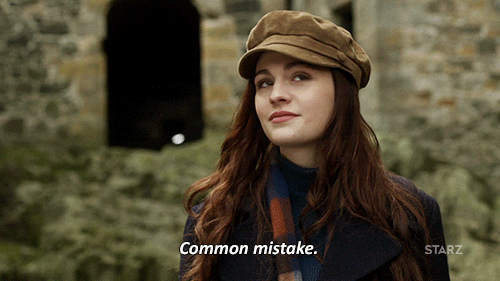
A WEE BIT ABOUT THE HISTORICAL FICTION GENRE
In its broadest terms, historical fiction is a fictional story set in the past. Some stories lean more on the fiction and less on the historical. These include few, if any, real historical people or incidences. The period is for setting purposes only and not integral to the plot.
Others lean much harder into the “historical” part. Actual events are experienced through the characters and vital to the plot. The writer will also weave historical characters through the story interacting with the fictional characters. Outlander falls into this second category. When done well (as Diana does with the Outlander series), the fictional characters can feel very real. Maybe that’s one reason we book fans always want to protect them!
When we read or watch historical fiction, three time periods influence our perception:
- The time of the setting(s)
- The time the author created it, and
- The time we are consuming it (reading or watching).
Today’s norms are different than post war 1940s, turbulent 1960s and the 18th century. Our knowledge and perspectives may also differ depending our own country of origin, its current climate and history. However, we’ve also seen norms change quite a bit since the 1987 culture when Diana started writing this series. So, be conscious of all three, but focus on the first.
Accuracy Helps
Writing well-crafted historical fiction can be a challenge. Even for a stand-alone novel, it’s no easy task to weave historical people and events seamlessly and plausibly through a plot with fictional characters, while maintaining historical accuracy.
So, creating an intricate yet expansive saga like the Outlander series accurately requires tremendous research. Between the Outlander and Lord John series, Diana explores quite a staggering array of historical events, people and cultures.
Her research library now holds over 2300 titles and counting. The defining elements of historical fiction genre include characters, language, settings, culture, customs, plot, themes and world building. Topics include Native American rituals, torture, Celtic traditions, military strategy, nobility, Scottish legends, Free Masonry, sadism, shamanism, herbal medicine, biographies etc.. and that just barely scratches the surface.
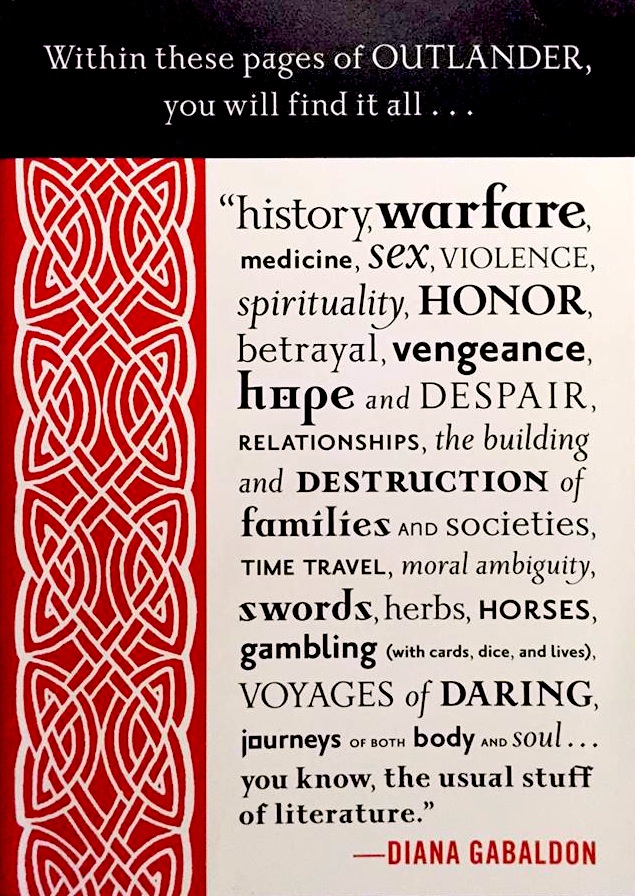
The rich detail and authenticity woven through each page makes this story immersive, educational, engaging and addictive. It is also historically and culturally accurate (with all its good, bad and ugly).
In addition to the big historical movements, Diana grafts many factual minor elements and incidents into the story. This immerses the reader (viewer) into the world, and I love discovering them.
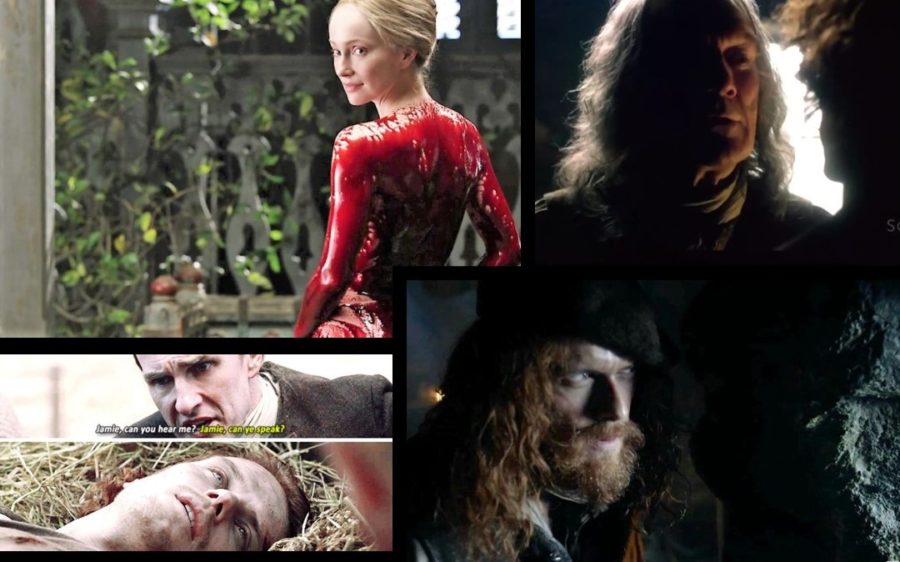
An actual officer in the Lovat regiment, James Fraser, solely escaped execution after being trapped with 18 wounded men in a nearby farmhouse after Culloden. The Dunbonnet story is a real legend. On Jamaica, you can tour Rose Hall, once owned by a witch. A journal account and illustration of a slave impaled alive on a raised hook at a plantation inspired the story of Rufus at River Run. Lord Lovat did in fact have a reputation of double dealing, forced marriages and fathered bastards.
To date, over 300 true historical figures, major and minor, appear in this book series. Diana also integrates daily living customs, procedures, traditions, native species and beliefs through the characters’ lives as well as their personal histories. The showrunners also conduct extensive research to visually represent the period through content, sets and costumes. These elements saturate our fictional characters and story to build a world that feels very real and transports us.
Historical Perspective
But it’s not just about facts — it’s about perspective. Diana often gives readers a new way to see something that possibly differs from the historical record, which can be slanted depending on who is writing it and why. An old newspaper article may have a politically skewed purpose. Textbooks may want to put their country of origin in the best light. Sometimes historical authors used the past to validate their own present opinions. This demonstrates presentism because it emphasizes validating facts, ignores contrary ones, and skews the picture. As Brianna says toward the end of this clip… History can’t always be trusted.
So, Diana gleans from multiple sources. She leans heavily on firsthand accounts, letters and journals, which also capture the language, culture and style of the period. She filters all of this though historical record (from multiple sides) to gain a true picture.
Diana has described her work as a pattern created by a kaleidoscope (colored fragments in a tube, turned to form a pleasing picture from the reflection of three mirrors). Historical reality is just the first mirror that creates what we see. It’s just the beginning.
Character Perspective
The second mirror of this kaleidoscope reflects the characters in the story — who they are, their motivations and their personal histories. Diana is brutally honest about her characters and their thoughts or actions in every moment (good or bad). Remember this when you start to feel a modern knee jerk reaction.
She embodies the soul of each character with everything they think, feel and believe based on their own culture, perspective, personal history, genetics, knowledge, fears and values. She doesn’t write FOR the audience and how they will react. These books are character driven, not plot driven or reader driven. She doesn’t think, “Well even though this is what Jamie would actually think in this situation, I can’t say that because today’s PC culture would think he is a racist.” OH NO… not Herself. She always remains true to that character at that time, in that circumstance. Period.
Even in observations and exposition, she writes information the way the character would perceive it, the way they would describe it, noting what they would deem important and leaving out what they would think didn’t matter. You hear through each character’s perspective with a clear difference in tone, language, rationalization, fears, perception, sarcasm, attitude and conclusions. There’s no objective POV. This gives Diana’s characters extreme consistency and definition. They become people we intimately know. Why do you think we cringe when the show writers mischaracterize them?
Presentism in Action
Sometimes this brutal honesty contrasts against our own social norms, values and ideals. I can almost guarantee it will at some point. My own values and beliefs have evolved and progressed in the span of my own lifetime. So, surely they will not always match the values, norms, actions and reactions of our favorite characters who live 250 years in the past!
Rather than process these conflicts in the context of time, circumstance, character as well as the knowledge, norms and limitations of the period, some people opt for 21st century judgment. They attach modern labels that didn’t even exist as a concept in the 18th century. Their current progressive sensibilities become offended.
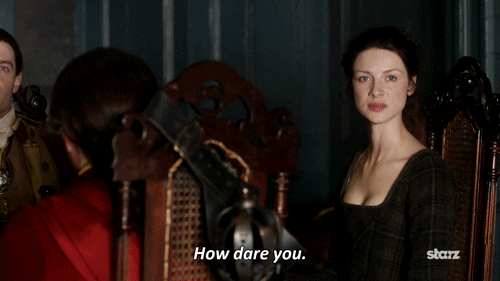
Then fandom kerfuffle swells with shocked exclamations, “What a misogynist!” “How sexist!” “They’re excusing spousal abuse” “That’s marital rape. She didn’t give informed consent” “Oh great, the ‘white savior’ syndrome” “How dare he bring up her virginity?!” “That’s racist” (mind you, the definition of what is considered “racist” has changed in just the last 20 years). And my personal favorite: “That’s such a backward way of thinking!” Um, yes, yes it is. And?
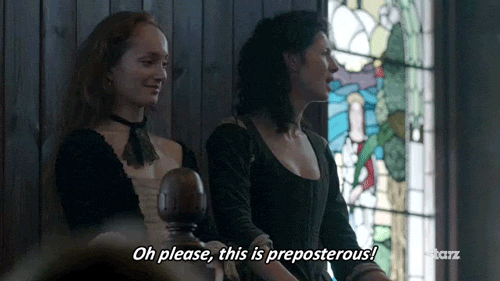
Don’t color history with the lens of the present. You miss so much when you do. Remember, societal norms, beliefs, laws, knowledge, obstacles, industry, communication, law enforcement (thus legal protection), medicine and customs have all changed over time.
Who knows how we will appear to people looking back on us in 200 years? “Judge not, lest ye be judged.” Aye?
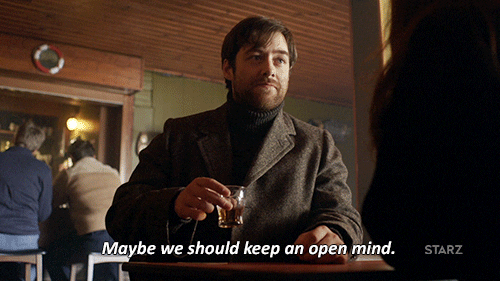
For example, women’s rights have changed dramatically even over the last 100 years. During the 18th century women were completely dependent and subject to their husbands with no real legal rights of their own. They went from their father’s hearth to their husband’s. Without a man or family, their choices for survival were slim. Today, we have five women in the U.S. Presidential race. Do you think George Washington ever envisioned a future female President?
You will roadblock your journey to the 18th century if you try to judge these characters by today’s values of feminism, the “me too“ movement and “know your value” philosophy. You will be disappointed.
Other examples include slavery, corporal punishment, hygiene (#PeeGate anyone?), religious beliefs, homosexuality etc. Every character, even the King of All Men, will fall short of your modern ideals at some point because they are not of this time. You must see them in the context of their time and experience.
Now, reacting to the action itself is a different thing.
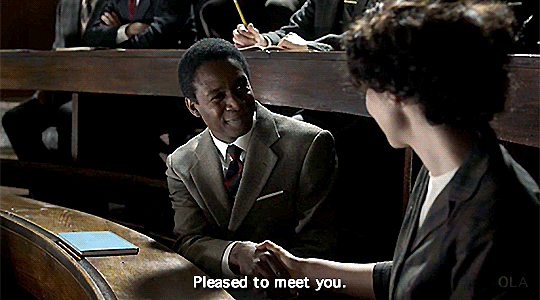
Consider the scene where Claire starts medical school, and she and Joe Abernathy get ignored by their classmates. We should maybe feel sadness about how women and people of color were treated at that time. We should feel upset for Claire and Joe. We should be inspired even by the extra challenge they both faced and conquered. However, the people in the class were acting normal for that time. That’s the point. Claire and Joe were breaking new ground, entering a profession in the ’50s not welcoming to women or people of color. While the class reaction may sadden us, we are also inspired. We discover why they bonded as two outlanders, and it teaches us how far we have come. However, it IS period accurate. These were not horrific people; they were not all vile racists and misogynists. It showed the typical attitudes and culture of the time.
While presentism certainly happens with book readers, I see it more often with the show, from both the show writer and viewer perspectives. It may be tougher for a TV viewer to let go of their world and immerse into another than it is for a book reader. The books are longer and more detailed. The medium requires more focus to consume. It’s more intimate in a way.
Show writers may feel pressure to give the show a broader and more acceptable appeal to a bigger audience who may not be as invested. So they “cleanse” the content. The result? We lose spiritual references because they don’t want to offend anyone. We lose Jamie arguing with Claire over abortion because it’s a current hot button issue. They overplay Claire as the hero to reiterate the “strong woman” theme. And so on.
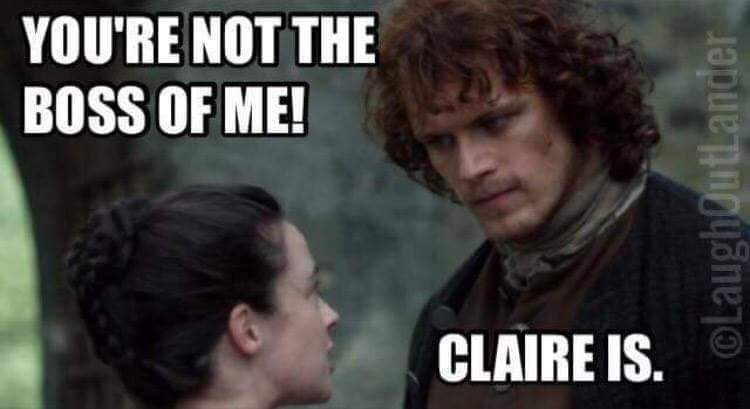
They may go the other direction as well to ramp up drama. In other words, a character may do something that he never would or inappropriate to the time period because the writer wants to heighten the drama or boost the visual. (Another pet peeve).
I could list many examples, but here’s just one: Lord John getting it on with Judge Alderdyce in Jocasta’s pantry. This was … just no. NO.
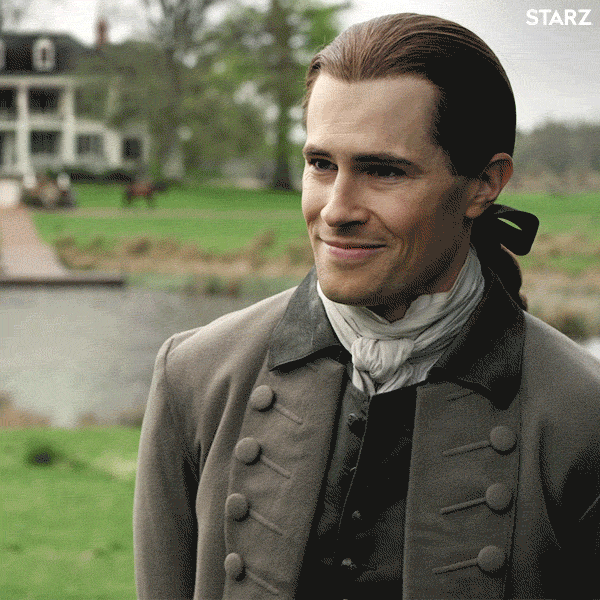
- Lord John would never be so indiscreet with a stranger who is also a Judge AND a fellow guest
- This is a scandalous crime in this time. He would never risk dishonor to a house where he is a guest, ESPECIALLY when his host is Jamie Fraser’s aunt.
- He is there at Jamie’s introduction. He would not risk their friendship and his family honor this way.
- And fourth, he is there to check on Jamie’s daughter, who is under the same roof.
Och weel… it was certainly visual and dramatic.
The Last Plane of Reflection
Remember the three-mirrored kaleidoscope Diana turns to create story? We discussed two mirrors so far — the historical reflection and the character’s reflection. The third reflection is her own. In her words, “the background, experiences, perceptions and personality that make me unique.” All three blend to create the intricate, layered patterns on the page.
We should do the same, but don’t let your own perspective block out the others. You can never truly appreciate historical fiction if you do.
Do you believe presentism gets in the way of people appreciating Outlander?


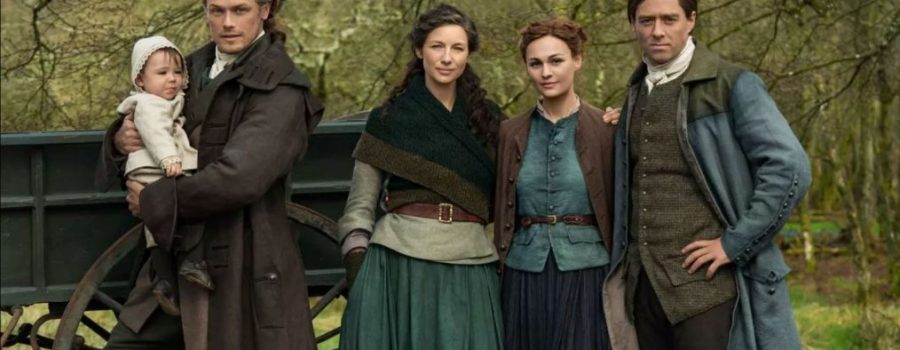



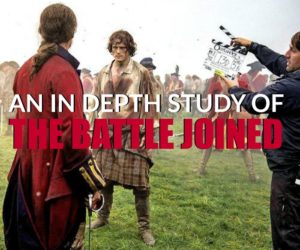
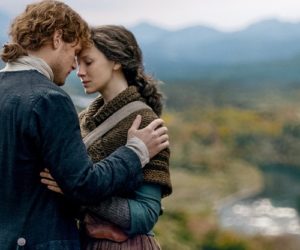
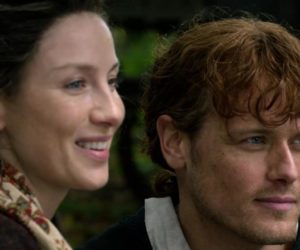
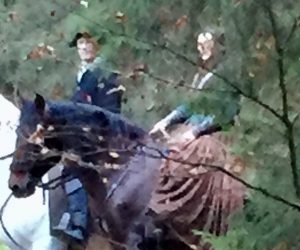





76 Comments
Leave your reply.